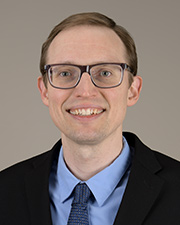Robert W. Regenhardt, MD, PhD

Vascular and Interventional Neurologist
Assistant Professor
Department of Neurology
Dr. Regenhardt Sees Patients at:
UTHealth Houston Neurosciences Neurology-Memorial City
915 Gessner Road, Suite 600
Houston, TX 77024
Phone: 832-325-7080
Fax: 713-512-2239

Dr. Robert Regenhardt has expertise in the management of intracerebral hemorrhage, subarachnoid hemorrhage, subdural hematoma (SDH), cerebral aneurysms, dural arteriovenous fistulas (DAVF), carotid cavernous fistulas, arteriovenous malformations (AVM), ischemic stroke, acute large vessel occlusion, intracranial stenosis and atherosclerosis, carotid artery stenosis, idiopathic intracranial hypertension, epistaxis, and oropharyngeal hemorrhage.
He performs the full spectrum of endovascular procedures, involving the brain, head, neck, and spine, for hemorrhagic and ischemic diseases. These procedures include aneurysm embolization, coil embolization, stent-assisted coil embolization, flow diversion treatment, intrasaccular embolization, intracranial embolization, embolization with liquid embolics for DAVF and AVM, middle meningeal artery embolization for SDH, mechanical thrombectomy, intra-arterial infusions, intracranial stenting, carotid artery stenting, transverse sinus stenting, extracranial head and neck embolization, diagnostic cerebral angiography, and diagnostic spinal angiography.
A native of Florida, Dr. Regenhardt received his Bachelor of Science with honors in the combined early acceptance BS-MD program at the University of Florida. As part of the combined MD-PhD program, he earned his PhD in physiology and neuroscience, followed by his MD with honors from the University of Florida College of Medicine, where he was inducted into the Alpha Omega Alpha Honor Medical Society. He completed residency training in neurology at Harvard Medical School’s Massachusetts General Hospital and Brigham and Women’s Hospital.
Following residency, he completed a clinical fellowship in vascular neurology and an NIH-funded postdoctoral research fellowship in translational stroke at Massachusetts General Hospital and Brigham and Women’s Hospital. He then completed a clinical fellowship in neuroendovascular surgery at Massachusetts General Hospital, mentored by leaders in the field with backgrounds in neurosurgery, neuroradiology, and neurology. Following fellowship training, he joined the faculty and medical staff of Massachusetts General Hospital before being recruited to UTHealth Houston.
Dr. Regenhardt serves on several journal editorial boards, including Stroke: Vascular and Interventional Neurology, Journal of Neuroimaging, Frontiers in Neurology, and The Neurohospitalist. He also serves as an ad hoc peer reviewer for numerous journals, including The BMJ; JAMA Neurology; Neurology; Annals of Neurology; Journal of Neurology, Neurosurgery, and Psychiatry; Clinical Neurology and Neurosurgery; Neurosurgical Review; World Neurosurgery; Stroke; Translational Stroke Research; Journal of Stroke; Journal of the American Heart Association; Journal of NeuroInterventional Surgery; Interventional Neuroradiology; American Journal of Neuroradiology; and Radiology, among many others. Dr. Regenhardt is an active member of many professional societies, including the Society of Vascular and Interventional Neurology, where he serves as vice chair for abstracts, and on the annual meeting, research, and digital strategy committees; Society of NeuroInterventional Surgery; American Society of Neuroimaging, where he serves on the communications committee; American Heart/Stroke Association; and American Academy of Neurology. He has been recognized with a long list of awards, including the Distinguished Service Award, Science for Life Award for mentorship, Global and Humanitarian Health Certificate, Science and Clinical Investigation Certificate, McKinney Award, and subsequently the Qureshi Award from the American Society of Neuroimaging, Editor’s Choice Award, and Top Cited Article Award for several years by the Journal of NeuroInterventional Surgery and Journal of Neuroimaging, among many others.
Dr. Regenhardt’s research interests span the spectrum of translation for cerebrovascular diseases, and he has served as principal investigator on numerous research projects. Funded by an NIH T32 award, his PhD dissertation examined the effects of a neuroprotective peptide. As a resident, he was selected for a NIH R25 which supported his research during residency and subsequent postdoctoral research fellowship at the J. Philip Kistler Stroke Research Center at Harvard Medical School. Dr. Regenhardt’s other research support included funding from the Harvard Center of Expertise Global and Humanitarian Health Grant, Massachusetts General Hospital Global Health Service Award, Society of Vascular and Interventional Neurology Pilot Research Grant, and Heitman Young Investigator Career Development Award.
Using advanced neuroimaging techniques, his current research focus is to better understand infarct growth despite thrombectomy and reperfusion injury and hemorrhagic transformation after thrombectomy. He also studies thrombus samples retrieved from thrombectomy to better understand how their biology is related to procedural success and clinical outcomes. Dr. Regenhardt has also served as site PI for several large industry-sponsored studies, including those evaluating the Thunderbolt aspiration system for thrombectomy and FRED and WEB devices for complex aneurysm treatment. Recently, he has also been involved in investigator-led national and international multisite studies for various cerebrovascular diseases including distal medium vessel occlusion stroke, large vessel occlusion stroke requiring rescue stenting, and novel cerebral aneurysm treatments. As of 2024, his work in translational cerebrovascular research has resulted in more than 180 publications in many premier journals.
Collaboration with Referring Physicians
Physicians at UTHealth Houston Neurosciences engage referring physicians in the care of their patients, keeping them informed about patient progress throughout the evaluation and treatment process. After a patient’s treatment, referring physicians receive a summary and a plan for follow-up. Our physicians encourage continued communication about each patient.
Languages Spoken:
English











